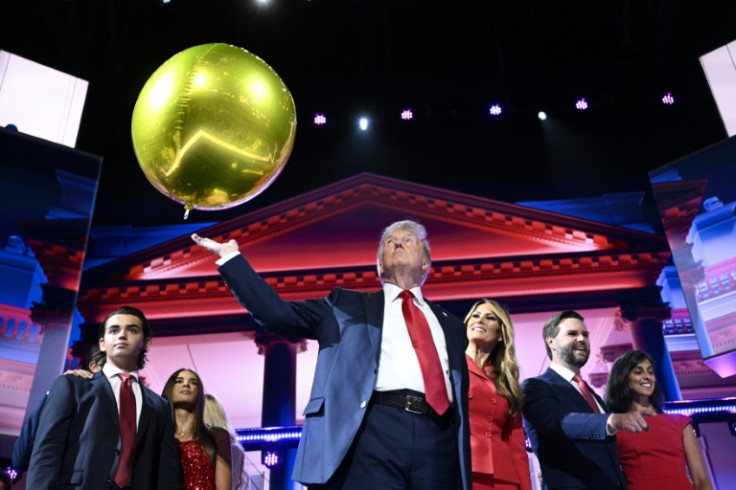
America is witnessing a split-screen moment for the ages: a wounded but triumphant Donald Trump uniting Republicans behind his White House bid as his Democratic rival Joe Biden's campaign teeters on a cliff edge.
Trump bathed in adulation as he accepted the Republican presidential nomination in Milwaukee on Thursday after four days of a convention underlining his total domination of the party.
Campaign promises that he would recast himself as a great unifier in the wake of surviving an assassination attempt last weekend quickly fizzled once he took the stage.
Trump began with lofty words about Americans being "bound together by a single fate and a shared destiny." But for more than an hour he then veered into a meandering litany of false accusations and dark exaggerations painting the country as crippled by violence and reeling from an immigrant "invasion."
Still, if Trump missed an opportunity to reach out to the wider country, he accomplished his main mission of demonstrating absolute control over the Republican Party and firing up his base.
Meanwhile, an increasingly isolated Biden watched from the sidelines, while calls mounted within his Democratic Party for him to step aside for a younger candidate in November.
Battling a Covid infection in his Delaware beach home, Biden will again likely be out of public view Saturday, while Trump holds his first rally with newly minted running mate J.D. Vance in Grand Rapids, Michigan.
The contrast could not be more brutal, said University of Virginia politics professor Larry Sabato.
"Trump survived an assassination attempt, turned it into an iconic political moment and had a unified convention that elevated him to sainthood," Sabato told AFP. "Biden could barely walk up and down the steps of Air Force One -- filmed and shown to the entire country."
"More senior members of his own party turned on him and are trying to push him out of his reelection campaign. And if he doesn't go, he'll very likely lose badly to the worst president in American history."
Less than two months ago, Trump was convicted of 34 felony counts in Manhattan, leaving many Republicans despondent about the election.
But it has been win after win for Trump -- in the courts and on the political stage -- since. His narrow escape from a shooter's bullet last Saturday only seemed to symbolize the Republican's lucky streak.
In Milwaukee, Lola Sheldon-Galloway, 64, a delegate from Great Falls, Montana, raved about the buzz the convention had generated among the 50,000 Republicans in town for Trump's big week.
"Man, we're going places with the Republican Party. I'm so grateful to be part of it," she told AFP.
"It was just so inspiring and I felt like it was very unifying," 64-year-old Terry Arnold, from the Seattle area, said of her first convention experience.
"There was excitement, hope," she said. "Unity for me was the theme that really shone through."
Trump entered politics as a bull in a china shop, dividing Republicans with his brash rhetoric and sparking calls for an alternative standard-bearer at the 2016 convention.
His success in uniting the entire party behind him in the eight intervening years -- despite losing his reelection in 2020 and a torrent of the kind of scandals that normally end political careers -- is perhaps his greatest feat.
AFP interviewed delegates from all corners of America on the convention floor, at sideline events, in bars and on the street -- and heard no dissent.
On stage, Trump's former adversaries and rival White House hopefuls Ron DeSantis and Nikki Haley urged Republicans to get behind his candidacy.
But with Democrats pointing to polling showing that the race is still tight, not all Republicans are so confident.
"I think the stakes are high and we can't just rest and think that, because of everything that's happened, that it's a shoo-in, because it's not," said Suzie Razmus, a member of the Kentucky delegation.
Donald Nieman, a political analyst and professor at Binghamton University in New York state, said the convention was unlikely to move the needle much.
"It's really a pep rally for the faithful," he said, "and not likely to change many minds."








